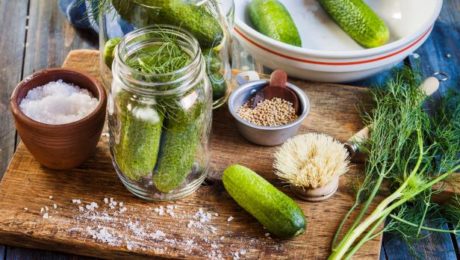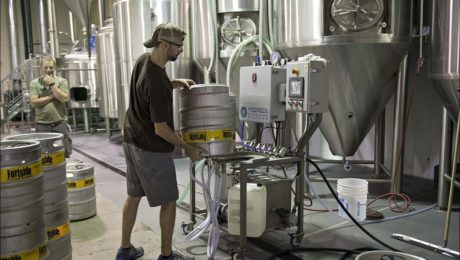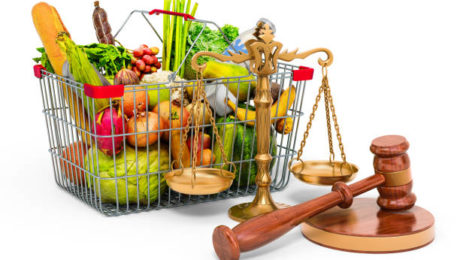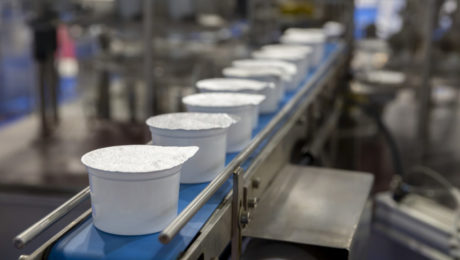FDA: Pickles & Yogurt “Unhealthy”?
Pickle and yogurt brands are speaking out against new labeling rules proposed by the U.S. Food and Drug Administration. The FDA’s new guidelines say some brands of the fermented products cannot be marketed as healthy because pickles are too salty, while some yogurt has too much sugar.
The guidelines are being updated for the first time since the 90’s. They redefine what can be labeled as “healthy” on a food package. Healthy products have high amounts of key nutritious ingredients, like fruits and vegetables, and low amounts of added sugar, sodium and/or saturated fat. Those updated nutrient content claims would go into effect in 2026. They wouldn’t ban “unhealthy” foods, but prevent the use of “healthy” on a label.
“Pickles have a role to play in a healthy diet because they are predominantly comprised of vegetables and serve as a delicious condiment to other nutrient-dense foods,” Pickle Packers International said in a statement.
Though pickles are made from low-sodium cucumbers, they are either fermented through a brine made of water, salt and seasonings or preserved in a brine of vinegar, salt and seasonings. Without enough salt in the brine, bacteria can grow and spoil the pickles. The new guidelines put the limit for sodium from a vegetable product at 10% of the daily value per serving (230 milligrams per serving). But most pickles include 11% sodium per serving.
Yogurt, too, is under fire. The new guidelines outline that a ¾ cup of yogurt should only include 5% per serving of the daily value of sugar (2.5 grams of added sugar per serving). Chobani’s plain greek yogurt includes 5.5 grams of sugar per serving. Chobani has actively protested the FDA’s ruling, noting that “reducing sugars to the level proposed by FDA for the ‘healthy’ claim would result in significant, deleterious effects to product quality, taste, and texture.”
Other companies are protesting the FDA’s guidelines – like General Mills, Kellogg’s, SNA International, the National Pasta Association and the Consumer Brands Association. The FDA guidelines put tighter restrictions on cereal and pasta, too.
“Hardly anything would qualify, so of course food manufacturers don’t like the idea,” says Marion Nestle, emeritus professor of nutrition and public health at New York University. She told nutrition and medicine publication STAT that the FDA’s regulation “automatically excludes the vast majority of heavily processed foods in supermarkets, as well as a lot of plant-based meat, eggs, and dairy products,” from bearing the healthy claim.
The publication notes nutrition experts gave “overwhelmingly positive remarks.” The new guidelines are supported by the American Society for Nutrition, the Association of State Public Health Nutritionists and the Robert Wood Johnson Foundation. Some experts argued the GDA could go further in restricting the healthy label.
Read more (STAT)
- Published in Food & Flavor, Health
Food and Beverage Laws Passed in 2022, Part 2
Evident of the desire to help local businesses bounce back from the pandemic, the remainder of food legislation passed in 2022 was aimed at helping businesses — especially brewers. Outdated alcohol beverage laws revamped in many states and many cottage food producers can sell homemade food with less restrictions.
In our last newsletter, we shared the food and beverage laws passed in the first half of the United States in 2022. The list below completes the balance of the country — Massachusetts to Wyoming.
Michigan
HB4232 — Aids small businesses in filling labor shortages in restaurants by expanding eligible workforce to allow 17-year-olds to waitstaff to sell and serve alcohol.
HB5695 — Amends Michigan Liquor Control Code to allow a minor employee who is at least 16 years old to build a display of certain brands of alcohol, mark the price on those brands, rotate them and place them on shelves.
HB5696 — Amends the Youth Employment Standards Act to allow a minor to be issued a work permit for employment with an establishment where alcoholic beverages are distributed.
HB5744 — Codifies the licensure and regulation of certain persons engaged in processing, manufacturing, production, packing, preparing, repacking, canning, preserving, freezing, fabricating, storing, selling, serving, or offering for sale food or drink for human consumption;
HB5747 — Allows for a certificate of free sale from the Michigan Department of Agriculture and Rural Development (MDARD) for milk and dairy products.
HB6105 — Allows alcohol wholesalers to distribute non-alcoholic beverages to retailers and allows use of electronic coupons under certain circumstances.
HB6106 — Allows wineries and breweries to make and sell private label products.
HB5984 — Allows the consumption and service of food, beverages and alcohol in public swimming pools.
SB656 — An act to create a commission for the control of the alcoholic beverage traffic within this state.
Minnesota
HB918 — Creates a Food Truck Permit under the local alcoholic beverage control law, allowing food truck vendors to sell alcoholic beverages.
SB2844 — Provides funding to construct the Mississippi Alcoholic Beverage Control Warehouse.
SB3008 — Makes several changes to Minnesota’s liquor laws. Known as the “Free the Growler” bill, the new law raises the cap on growler sales. It also allows more off-sale options for smaller breweries and expands license opportunities for specific cities and events.
Mississippi
HB684 — The state’s Small Business and Grocer Investment Act. Develops quality retail food outlets for jobs, expands markets for Mississippi farmers, supports economic vitality in underserved communities. Increases access to retail food outlets that sell fresh and healthy food. Provides a dedicated source of financing for healthy food retailers in Mississippi.
HB1135 — Allows home delivery of alcoholic beverages from licensed retailers.
SB3015 — Earmarks funds for the State Department of Agriculture and Commerce, including costs of the Farmers Central Market.
Missouri
HB1697 — Allows cottage food producers to sell food over the internet. Removes the $50,000 annual sales limit for cottage food producers.
New Hampshire
HB314 — Raises the maximum annual gross sales of food by a homestead or cottage food operation from $20,000 to $35,000.
HB1039 — Amends alcohol law, allowing beverage manufacturers to sell beers made on-site to state-based wholesalers.
HB1584 — Establishes a capital improvement grant program for the benefit of state fairs and agricultural fairs.
SB17 — Allows dogs in outdoor dining areas.
SB212 — Lowers liquor license fee to $300 (from $1,692) for brewers selling less than 1,000 cases of liquor per year.
New Jersey
AB462 — Permits pedicabs to operate while passengers are consuming alcoholic beverages.
AB3991 — Exempts raw, unprocessed honey from the health department’s cottage food regulations.
New York
AB2344 — Requires food service establishments to post food allergens at restaurants and in food ordering services.
AB3954 — Establishes New York State Council on Food Policy. Establishes policies to help New Yorkers avoid food insecurity and eat as much New York-grown and produced food as possible. Supports growth of a New York-based local farm and food product economy to revitalize rural, suburban and urban farms.
AB8620 — Authorizes a licensee to sell wine for consumption on the premises to also include the sale and consumption of shochu (Japanese alcoholic beverage).
AB10176 — Allows alcohol license holders to sell liquor at off-premise catering establishments.
SB771 — Amends the Nourish New York program to define products as those grown, produced, harvested, butchered, canned or freezed in New York.
SB5438 — Amends alcohol beverage control law to authorize tastings at licensed premises by distillers.
SB7655 — Amends the definition of New York State-labeled beer to require that at least 60%, by weight, of its hops and at least 60% of any other ingredients are grown in New York.
SB7823 — Creates an advisory group which will produce a report on improving urban and rural consumer access to locally produced, healthy foods.
SB8989 — Authorizes the manufacture of beer, spirits, cider, wine and mead at the Culinary Institute of America.
SB9093 — Amends alcohol beverage control law to allow parcels of land to the list of premises which are exempt from the law’s provisions. Restricts manufacturers/wholesalers and retailers from sharing an interest in a liquor license.
SB9385 — Amends alcohol beverage control law to allow a restaurant located within 200 feet of a school to serve alcohol.
North Carolina
HB768 — The 2022 ABC Omnibus, decreases regulations on bar owners and expands the freedom of alcohol sales and transportations. Eliminates the $1 membership requirement for people at visiting private bars.
SB762 — North Carolina Farm Act of 2022.
Ohio
HB629 — Increases microdistillery production limits and allows spirituous liquor tasting samples at agency stores free of charge.
SB102 — Modifies Ohio’s liquor laws. Eases restrictions on local homebrewers and fermenters, exempting them from certain liquor law permits. Allows homebrewers to make beer or wine without a liquor permit, serving it on private property for personal consumption. Homebrewers cannot sell homemade beer or wine. Permits a person under the age of 18 to handle beer and liquor at a hotel, bar or restaurant. Eliminates provision that more than 30% of a restaurant gift card could not be used to purchase alcohol. Authorizes a retail liquor permit holder to sell beer or liquor on Sunday. Allows charitable or political organizations to give away beer or liquor as a prize at a raffle or auction.
Oklahoma
SB269 — Allows a mixed-beverage licensee selling wine, beer or cocktails to-go to provide a different price than they do for drinks that are served on premises.
SB757 — Allows for small brewer and small farm wineries to deliver alcohol.
Pennsylvania
HB1615 — Allows breweries to sell malt or brewers beverages to non-licensees and licensees that also sell malt or brewers beverages. Allows all liquor license holders to offer amplified sound in their establishment (previously only allowed for wineries).
Rhode Island
HB7095 — Part of the “Take It Outside” campaign, allows restaurants to continue approved outdoor dining, which was originally approved only for the pandemic. Extends moratorium on municipal enforcement of outdoor dining requirements.
HB7209 — Eliminates sunset date on the law that allowed takeout drinks. The new law now permanently allows Class B liquor license holders and brewpubs to sell distilled spirits with takeout orders.
HB7438 — The Toxic Packaging Reduction Act, prohibits food packaging with PFAS intentionally added in any amount from being manufactured, knowingly sold or distributed in Rhode Island, as of Jan. 1, 2024.
South Dakota
HB1322 — Expands definition of cottage food to include all shelf-stable foods, and even some foods requiring refrigeration, provided the seller completes regular food-safety training. Cottage food producers will still be required to label items with a product name, the name of the producer and a disclaimer that it wasn’t produced in a commercial kitchen.
SB101 — Allows any person 19 years or older, who is certified by a nationally recognized alcohol management program, to draw, pour, mix, serve and sell alcoholic beverages if the licensee is at least 21 years of age and on the premise when the alcohol is being served.
SB188 — Allows for unlicensed businesses to store alcoholic beverages.
Tennessee
HB1688 — Creates a common carrier license to be issued by the alcoholic beverage commission to a person or corporation that transports alcoholic beverages for a fee.
SB693 — Enacts the Tennessee Food Freedom Act, specifying circumstances when persons may sell certain homemade food products. Allows people to sell shelf-stable food products without a license, as long as they don’t require temperature control.
SB2270 — Authorizes a special occasion license to designate an area in which liquor-by-the-drink licensees may sell alcoholic beverages and beer to patrons who may consume the alcoholic beverages and beer anywhere in the designated area. Authorizes a festival operator licensee to provide a list of the liquor-by-the-drink licensees that will sell alcoholic beverages and beer to patrons in the designated area of the festival.
Utah
HB142 — Allows wild game to be donated to food banks and charitable organizations.
Virginia
HB426 — Creates a third-party delivery license that authorizes the licensee to deliver alcoholic beverages purchased by consumers from other retail licensees.
HB837 — Requires any food manufacturer, food storage warehouse, and retail food establishment to obtain a permit from the Commissioner of Agriculture and Consumer Services prior to operating.
HB1336 — Convenes a working group from representatives of the state’s alcoholic beverage control authority, Virginia Wineries Association, the Virginia Wine Wholesalers Association, the Virginia Beer Wholesalers Association, and the Virginia Craft Brewers Guild and other relevant stakeholders to address various needs, including evaluating the number of barrels of beer allowed under a license and reviewing distributing through the Virginia Winery Distribution Company.
SB146 — Guarantees that State Board of Health regulations should not require an establishment that only sells prepared foods to have a certified food protection manager on site during all hours of operation.
SB315 — Increases the amount of alcoholic beverages that can be transported through the state from one gallon to three gallons.
SB519 — Authorizes sale and service of alcoholic beverages for casinos.
Washington
HB1145 — Allows non-wood, renewable fiber in 2 recycled content paper carryout bags.
HB1359 — In light of the ongoing Covid-19 pandemic, reduces liquor licensing fees temporarily.
SB5619 — Conserves and restores kelp forests and eelgrass meadows in Washington State.
- Published in Business
Food and Beverage Laws Passed in 2022
Two-and-a-half years into the Covid-19 pandemic, state legislators continue to pass laws aiming to aid food businesses impacted by the pandemic.
Bills passed in the 2022 legislative session further loosen the reins on the archaic alcohol laws that dominate state alcohol departments, permanently adopt formerly temporary laws aimed to help restaurants survive the pandemic, expand cottage food laws for the growing amount of home-based producers and help farmers by setting standards on the amount of local, farm-grown produce public institutions need to be purchasing.
More states are also aiming to become more green, banning PFAS food packaging, limiting single-serving utensils and requiring produce checkout bags to be compostable.
Below are the key food, beverage and food service laws passed in 2022. They are listed alphabetically in this article, Alabama through Maryland. We’ll feature the balance of the states — Massachusetts to Wyoming — in TFA’s next newsletter (January 25, 2023).
Alabama
SB22 — Allows retail establishments to serve wine for off-premise consumption, redacting the former bill that only allows for wine to be consumed on-site.
Alaska
SB9 — A comprehensive overhaul of the state’s 40-year-old alcohol licensing statute. Allows the state’s Alcohol Beverage Control Board (ABC) to issue licenses to government entities and tribal groups. The modernization eliminates bureaucratic red tape by extending tasting room operating hours, allows live concerts at taprooms and allows small communities to track mail and online alcohol sales to eliminate bootlegging.
HB298 — Establishes a task force on Alaska’s food systems and sovereignty.
Arizona
SB1248 — Deems it unlawful for a supplier to coerce a wholesaler to accept a delivery of beer that was not ordered or canceled.
HB2660 — Updates liquor licensing procedures.
California
AB 257 — Known as the Fast Food Accountability and Standards Recovery Act, it establishes the state’s first Fast Food Council to establish minimum standards on wages, working hours and health-, safety- and welfare-related conditions.
AB778 — Requires state institutions to purchase 60% California-grown food, in season.
AB1825 — Standardizes regulations regarding shipment and transport of California fruit, nut and vegetables.
AB2971 — Allows beer manufacturers to give up to five cases of retail advertising glassware to an on-sale retail licensee.
SB490 — The Buy American Food Act. Requires all state public institutions that receive federal reimbursements for meals to only purchase food products grown, packed or processed in the United States.
SB793 — Allows the Department of Alcoholic Beverage Control to issue a music venue license that would allow the licensee to sell beer, wine and distilled spirits at the entertainment facility.
SB 982 — Creates a certified organic apple program for apples grown in California.
SB 972 — Modifies the California Retail Food Code, allowing sidewalk food vendors to obtain public health permits. The new Compact Mobile Food Operation (CMFO) is defined as a non-motorized push-cart, stand, rack or display, pedal-driven cart or wage that must be cleaned and stored daily.
SB1013 — Adds wine and distilled spirits to the state’s recycling container redemption program.
SB1046 — Requires pre-checkout, produce bags in grocery stores to be reusable, recyclable or compostable.
SB1370 — Authorizes a theater company and a nonprofit radio broadcasting company that holds a license to sell and serve alcohol to also sell alcohol two hours before and one hour after the event.
Colorado
HB1017 — Increases the amount of alcohol beverages brought into the state that would be exempt from taxes.
Connecticut
HB5146 — Act Concerning Food Donation, makes it easier for supermarkets to donate their edible surplus produce or other food items to food relief organizations that are in need.
HB5271 — Extends temporary provisions put in place during Covid-19 for temporary outdoor food and beverage services.
SB187 — Increases maximum gross sales for cottage food operations from $25,000 to $50,000.
Delaware
HB46 — Permits brewery-pub and microbrewery license holders to brew, bottle and sell hard seltzers and other fermented beverages made from malt substitutes. Formerly, license holders could not brew hard seltzers or other non-malt based products without obtaining a Federal Brewer’s Notice.
HB81 — Allows two or more microbreweries to share brewing equipment if the microbreweries maintain separate premises to sell their product to consumers and wholesalers.
HB98 — Allows importers to take orders from retailers any day including Sundays and holidays and process them for delivery.
HB143 — Removes taprooms from the list of establishments that a commissioner can refuse to grant an alcohol license to when there is an existing licensed establishment of similar type within a specified distance.
HB226 — Extends immunity from civil or criminal liability to those who donate food to nonprofit organizations. Includes those who donate perishable food and wild game.
HB289 — Allows liquor stores, farm wineries, brewery-pubs, microbreweries, craft distilleries and wine auctions to provide curbside service. Sales are prohibited to intoxicated persons or persons under 21 years of age.
HB290 — Permanently removes the sunset provision of House Bill 1 that allowed food and drink establishments who suffered loss during the Covid-19 pandemic to continue selling alcoholic beverages in take-out, curbside or drive-through services — and to use outdoor seating for serving food and drinks.
HB427 — Allows persons 14 and 15 years old to be employed in places where alcoholic beverages are served, but not selling or serving alcohol.
HB463 — Amends current alcohol law, allowing a person 18 years or older to enter a tavern or taproom to pick up a food order for delivery through a third-party delivery service. Also allows a person 18 years or older to work in a tavern or taproom selling or serving alcohol as long as they’re not preparing alcohol.
SB46 — Amends current alcohol law, permitting wedding venues and other rental venues licensed as a bottle club to allow customers to bring alcoholic beverages
SB304 — Corrects code related to the regulation of seeds sold in the state.
SB334 — Allows restaurants that sell ice cream containing up to 10% alcohol by volume to sell such ice cream without the requirement to purchase at least $10 of food.
Georgia
HB1175 — The Georgia Raw Dairy Act. Authorizes and regulates the production, handling, transporting and sale of raw milk and raw milk products for human consumption. It also provides standards for safety, cleanliness and health for such products and animals producing them.
HB1443 — Allows mobile food service establishments that have active permits to operate in the state state, not just the county of origin as the bill previously allowed.
SB396 — Renames Georgia State Nutrition Assistance Program (SNAP) to the Georgia Grown Farm to Food Bank Program (F2FB). It requires food procured to be Georgia grown.
Hawaii
HB1568 — Requires public institutions to ensure a certain percentage of food purchased for public schools, youth campuses, public hospitals, public prisons and University of Hawaii system academic programs consists of fresh, local agricultural products. Requires an annual benchmark report from public institutions on their efforts.
SB335 — Requires the Hawaii Department of Agriculture to annually lease at least 50% of land leased or up for lease renewal to operations whose primary business is, or supports, local food production.
SB2331 — Expands the definition of “beer” under the state’s liquor tax and liquor regulatory laws to specify that the term includes an alcohol by volume of no less than 0.5% and alcohol seltzer beverages.
SB2992 — Establishes the Hawaii agricultural investment program to support local agricultural producers.
SB2960 — Requires the Department of Agriculture to partner with Hawaii’s agricultural community to establish and implement a food safety certification training program to help small- to medium-sized farms comply with federal food safety certification mandates.
SB3197 — Establishes a farmer apprentice mentorship program, encouraging young farmers in the state.
SB 2664 — Protects agricultural lands that grow taro, a native crop to Hawaii. Fermented taro is used to make poi, a popular Polynesian dish.
Idaho
HB646 — Expands definition of alcoholic beverages to include mead, cider and other fermented fruit juice beverages for personal use and to provide for the use and storage of homemade beer, wine and other fermented beverages at licensed premises.
HB744 — Allows distillers to donate their own liquor to charity, previously an illegal act.
Illinois
HB209 — Creates the Latex Glove Ban Act, banning use of latex gloves for use in commercial food prep.
HB2382 — Creates the Healthy Food Program Development Act, expanding access to healthy foods in eligible areas in the State by providing assistance to grocery stores, corner stores, farmers’ markets and other small food retailers.
SB3838 — Amends the Food Handling Regulation Enforcement Act. Provides that a farmer who sells meat, poultry, eggs or dairy products from the premises of the farmer’s farm is exempt from licensing by the farmer’s local health department under specified conditions. Provides that local health departments may issue Farmers’ Market Retail Permits for the sale of products at farmers’ markets and at semi-permanent events.
Indiana
HB1149 — Expands the cottage food law by allowing all direct sales of almost all nonperishable foods made by home-based vendors (except acidified canned goods), including online sales and in-state shipping. Requires an individual who sells poultry, rabbits, and eggs at a farmers’ market or roadside stand to comply with certain requirements.
HB1298 — Provides the alcohol and tobacco commission may not require physical separation between a bar area and a dining area in a food hall. Creates a temporary craft manufacturer hospitality permit that allows a craft manufacturer to participate in a convention, trade show, exposition or similar event on the licensed premises of a particular host permittee.
Iowa
HF2431 — Updates Iowa’s cottage food laws from “home bakeries” to “home food processing establishments.” Allows cottage food producers to sell most types of homemade food, including acidified canned goods, meat and poultry. Also allows cottage food businesses to sell online and ship products. Increases the sale limit for home food processors from $35,000 to $50,000.
SF2290 — Creates the Dairy Processing and Milk Production Innovation and Revitalization program, to aid the dairy industry in recovering from the pandemic and expand career opportunities and industry development in rural Iowa. Creates an artisanal dairy study to explore establishing an artisanal dairy processing program at a community college or university.
SF2374 — Overhaul of Iowa’s liquor licensing classifications. Allows Class C liquor licenses to purchase up to five cases of beer, high alcohol content beer or canned cocktails at any retailer, every 24 hours. It also includes Sunday Sales privileges on all Class C licenses. Includes fines for third-party food delivery services that use a restaurant’s logo or menu without permission. Also changes how Iowans can redeem beer and soda cans and bottles to collect nickel deposits.
Kansas
SB2 — Allows consumption of beer, wine or other alcoholic liquor on the Kansas state fairgrounds. Increases the number of temporary permits an applicant may receive from four to 12 permits per year.
SB346 — Allows on-farm sales of raw milk, with a label identifying the product as unpasteurized.
Kentucky
HB252 — Amends alcohol law to lower the minimum server age of employees to 18 and to exclude persons under the age of 20 from bartending.
HB500 — Modernizes Kentucky alcohol laws to aid the state’s thriving bourbon industry. Legalizes sales of barrel-aged and batched cocktails, a practice formerly not authorized in Kentucky since the alcohol was not poured from its original container. Authorizes private barrel selection events, allows distillers to sell exclusive bottles on-site at distillery gift shops, authorizes distilleries to open a satellite tasting room and allows distillers to offer complimentary samples and sell bottles at fairs, festivals and farmer’s markets.
HR15 — A resolution recognizing March 22, 2022, as National Agriculture Day.
HR21 — A resolution recognizing October 12, 2022, as National Farmers Day.
HR31 — A resolution recognizing May 2022 as National Beef Month in Kentucky.
HR35 — A resolution recognizing June 2022 as National Dairy Month.
Louisiana
HB370 — Allows for self-distribution of beer or other malt beverages by in-state brewers.
HB523 — Allows licensed manufacturers or brewers of alcoholic beverages to host contracted private events at brewing facilities.
HB828 — Updates the state’s cottage food law, increasing the gross annual sales threshold under which a home-based preparer of low-risk foods may qualify for the protections of the statute known commonly as the cottage food law.
HB829 — Updates third-party alcoholic beverage delivery laws to clarify the delivery distance radius, necessary permits and penalties.
HR 78 — A resolution asking Congress to require the Food and Drug Administration to fulfill its duties related to the inspection and testing of imported seafood and to support the Illegal Fishing and Forced Labor Prevention Act. Collaboratively, these efforts would help restore economic opportunities for Louisiana’s fishing industries, protect the health of consumers, and make the international seafood trade safer for workers
SB450 — Allows a licensed wholesaler to transfer beverages between microbreweries.
Maine
LD1503 — Prohibits the use of toxic “forever chemicals” called perfluoroalkyl and polyfluoroalkyl substances (PFAS) in various products, including food packaging and cookware.
Maryland
HB 178 — Alters the definition of cottage food business to increase the cap on the annual revenues from the sale of cottage food products from $25,000 to $50,000.
HB275 — Prohibits a person from manufacturing, selling or distributing products with PFAS chemicals in the state of Maryland, including in food packaging.
SB569 — Extends the application dates of certain provisions related to certain holders of Class 4 limited winery licenses.
- Published in Business, Food & Flavor
Lawsuit Alleges Kombucha Exceeds Alcohol Limit
Four consumers — three underage — filed a lawsuit alleging Tribucha Inc. misled them into buying non-alcoholic kombucha that contains twice the alcohol permitted for non-alcoholic beverages.
The 30-page class action lawsuit contends Tribucha has been sold to “unsuspecting children, pregnant women, persons suffering with alcohol dependence issues, and a host of other people for whom alcoholic consumption may pose a grave and immediate safety and/or health risk.” The lawsuit says the North Carolina-based brand has a small disclaimer on the label stating that Tribucha “contains a trace amount of alcohol,” but an investigation proved otherwise. Plaintiffs used a lab accredited by the Alcohol and Tobacco Tax and Trade Bureau (TTB) to test the kombucha and found it is over 0.5% alcohol by volume, which classifies it as alcoholic.
The complaint continues: “Because Tribucha Kombucha does not include any warnings concerning the significant presence of alcohol, consumers, including Plaintiffs, are led to believe that the products are safe to consume when driving a car, operating machinery, and taking with potentially a deadly cocktail of incompatible medications.”
In 2010, Whole Foods and other retailers pulled kombucha off shelves as the TTB investigated whether alcohol levels in kombucha were higher than what was printed on the label. And since then, consumers — and even other brands — have filed lawsuits against various kombucha brands, alleging alcohol levels higher than indicated.
Kombucha can keep fermenting after it’s made, as the yeasts continue to eat sugars. Under current law, if kombucha leaves a processing facility at 0.4% ABV, but increases to over 0.5% by the time it’s placed on grocery store shelves, the brewer would have to pay federal alcohol taxes like a beer brand.
Kombucha producers fear constant repercussions from this law, says Hannah Crum, co-founder and president of Kombucha Brewers International (KBI), the trade organization for kombucha brewers.
Earlier this year, South Carolina’s Department of Revenue (DOR) categorized all kombuchas as alcoholic beverages. The state’s regulations set a maximum alcohol content for beverages but no minimum, so any fermented beverage with any alcohol content would be considered alcoholic. Since kombucha fermentation produces a trace amount of alcohol, a brewer would need to apply for a state alcohol license, and kombucha could not be sold to anyone under the age of 21. It contradicted the U.S. legal definition of an alcoholic beverage.
After kombucha industry leaders contacted the state’s DOR and the South Carolina Retail Association (SCRA) to share advice and resources, the regulation was amended to exempt kombucha. KBI’s leadership and legal counsel, along with producers Buchi Kombucha, GT’s Synergy Kombucha, Health Ade, Humm and Brew Dr. were involved.
Pending in Congress is the KOMBUCHA Act, legislation that would make kombucha beverages exempt from excise taxes intended for alcoholic beverages. The act proposes to raise the alcohol by volume (ABV) threshold for kombucha from its current level of 0.5% to 1.25%.
Reads a statement from KBI on the act: “These laws were never intended to make kombucha subject to taxes designated for beer. Passing the KOMBUCHA Act under the next appropriations bill will relieve this unnecessary burden on kombucha brewers. Only kombucha above that level (1.25%) will be subject to federal excise taxes when this Act becomes law.”
KBI has actively lobbied for the bill’s passage. Big kombucha brands (GT’s and Health-Ade) have actively supported the bill.
- Published in Business
Traditions of Fermentation, Cultural Appropriation & Diversity
Cooking isn’t limited to only making the dishes of one’s ethnicity. The cultural identity of that food becomes murky when it gets transactional. Commercializing a food without respecting and honoring its history and tradition is inauthentic, damning to immigrant producers and threatens to erase traditional foods.
“Someone with more power or dominance, they can create their own kimchi – that doesn’t have any resonance to its tradition – and get it on the shelves of Wal-Mart and make it commercially successful. I don’t have that opportunity because I’m a woman, I’m Korean, I’m a minority and I’m just trying to tell the story about kimchi in my way,” says Lauryn Chun, founder and CEO of Mother-in-Laws kimchi. Chun’s kimchi comes from her mother’s recipe used in the family restaurant in California, Jang Mo Jip. “It’s my heritage of food that I enjoy sharing with Americans.”
Chun’s experience is similar to many BIPOC producers. It’s difficult for minority producers to compete with the white-owned brands that often have more money to launch a food company and receive preferential treatment by retailers for store placement.
“When you turn it into a business and you’re profiting as a company, we need to be more sensitive and more deliberate in how we give credit to people,” adds Robert Danhi, chef and co-founder of Flavor360 Solutions (and a TFA Advisory Board member)
Speakers discussed the wide range of issues related to traditional foods in a panel during TFA’s conference FERMENTATION 2022 titled “Traditions of Fermentation, Cultural Appropriation and Diversity.” Panelists included Chun, Danhi, Beverly Kim (chef and owner of restaurants Parachute and Wherewithall in Chicago), Kheedim Oh (founder of Mama O’s Premium Kimchi and TFA Advisory Board member) and Ismail Samad (founder of Loiter and Wake Robin Foods). The discussion was moderated by Josephine Wee (assistant professor at Penn State University and a TFA Advisory Board member).
Do Cultures Own Their Foods?
“There’s appropriate appropriation,” says Oh, whose Brooklyn-based kimchi brand is also based off the recipe of Oh’s mother, a Korean American. “Some of these brands, is what they’re making even kimchi? Kimchi is such a popular buzzword now. But it’s an unfair advantage when you’re competing with me and Lauryn to get your kimchi on the shelf and it’s very loosely kimchi.”
Brands are coming to retail with condiments labeled kimchi that are far from the traditional Korean condiments. They’re skimping on ingredients, like not using traditional Napa cabbage and opting for cheaper produce varieties. Though there’s hundreds of versions of traditional kimchi, some brands are veering too far to gain sales (Oh joked about a raspberry cheesecake kimchi).
“We need to change the narrative from appropriate to appreciation, celebration and preservation,” Wee adds.
Should a culture own a fermented food? Like Koreans just selling kimchi? The panel didn’t agree with that notion. But Samad points out a culture’s food is taken away from them when it’s exploited.
Through his nonprofit Loiter, Samad tackles the effects of systemic racial and economic injustice. He’s helping the residents of East Cleveland by developing successful, community-owned businesses – like Wake Robin Foods, a fermented food brand Samad purchased. Wake Robin will create ferments using produce from local, urban farmers.
“It’s black owned by black farmers so we can get some black dollars circulating in our culinary economy so they can have some freaking version of reparations for what has happened,” Samad says. “For me this is straight financial, who gets the opportunity to scale up.”
Samad says there’s an entire food system of African fermented foods “not being appropriated or appreciated in the U.S.” He hopes to disrupt the market.
“There’s an opportunity to introduce products that are owned by own by us, and by us I mean the African Diaspora,” he says.
Nuances in International Dining
Many American diners, though, are “still even at the elementary level of understanding the differences between different cultures in a diaspora,” says Kim, a former Top Contestant. “Asian cuisine is not just one monolithic cuisine.”
Some pan-Asian restaurants sell sushi (Japan) alongside kimchi (Korea) and pad thai (Vietnam), a “mish mash” of foods from different Asian countries. “We have to “continuously dig deeper to show there are nuances between the cultures,” she says.
It can be a difficult concept for chefs, too, who are trained in primarily French cuisine at culinary school. When Kim went through culinary school, a short quarter was focused on global foods, “the rest is basically Fresh cuisine.”
Ethnic food — especially Asian fare— the food is often stereotyped as cheap, “it’s a bamboo ceiling that you can’t charge high prices,” Kim says. Western diners often don’t take into account the differences in quality of ingredients or the creativity, care and time in cooking a dish. “We’ve been seen as cheaper because we’re Asian, so people question why our prices are so high.”
Chun, who grew up helping in the family’s Korean restaurant, began Mother-in-Law’s kimchi questioning why kimchi wasn’t in the ranks of specialty craft foods like fine cheese.
“From the perspective of western fermented foods, from cheeses to wines to craft beers, those are the only things people are willing to spend their money on,” Chun says. She adds she felt very proud to be the first kimchi in specialty grocery store chain Dean and Deluca.
In retail, many international food brands get placed in the ethnic aisle. But why does a sauce from an international region get placed in the ethnic aisle while spaghetti is placed in the sauces aisle?
“I’m torn over the concept of that existing,” Oh says. “We’ve been subjugated to the ethnic aisle aka the global ghetto where there’s no reason for it except the fact that I’m Korean.”
Cultural Regulatory Bias
Are there conflicts between tradition and science? Panelists shared how some health regulators don’t understand cultural ferments, causing batches of fermented food to be deemed unsafe for human consumption and thrown out.
Kim attempted to start a wholesale kimchi brand during the brand. Studies prove kimchi is made safely at a pH range of 4.2-4.5, but the regulator from the health department was told Kim legally had to keep kimchi under pH levels 3.3 to keep it safe.
“There’s so much confusion around it, I had to reach out to food scientists to clarify it, and we don’t want to get in trouble,” Kim says. She ended up cancelling the brand because securing regulatory approval was so difficult.
Oh adds: “I think there’s a big cultural bias when it comes to fermented foods. In the U.S., it’s either the food is 100% clean scrubbed and pasteurized or it’s not – and the not is dangerous and dirty. Where fermented foods predates modern electricity and modern science, there’s a reason why it’s safe because it works out that it’s a very safe food because, through the lactic acid fermentation, it lowers the pH and that helps preserve the food.”
- Published in Business, Food & Flavor
Food Regulations Fall Short on Diversity
The laws around food production are confusing, costly and “don’t reflect diversity in food.” Cottage food producer laws allow budding chefs to start making ferments for retail sales, “but only if they’re made a certain way.”
An article in Minnesota Public Radio highlights a major gap in food regulation: immigrants are left out. Though food laws cover fermented kimchi and kombucha, for example, they’re restrictive for less common fermented foods and beverages from different cultures. Vino Raj, owner Square Root of Curry in Minnesota, points out that if he tried to make a fermented product from his native country, he’d have to “fundamentally change” the product to follow the state’s rules, “rendering them inauthentic.”
“You don’t see lots of South Indian foods because of that law,” he said. “The laws have not caught up to other forms of cooking.”
The barriers for immigrants wanting to start a small food business are especially high. Procedures often aren’t translated into other languages, commercial kitchens are challenging to find and expensive to rent, insurance and licensing is costly.
Pictured, Dao See, owner of Minne Street Rolls, sells traditional Lahu food and is advocating for Minnesota to sell more diverse food.
Read more (Minnesota Public Radio)
- Published in Business
Washington Brewers Sue Oregon
Three Washington breweries are suing the state of Oregon, arguing a law puts out-of-state brewers at an unfair disadvantage.
Oregon allows in-state brewers to sell their beer to licensed retail businesses. Out-of-state breweries that want to do the same must obtain a federal wholesaler’s permit, then use a licensed Oregon distributor. It’s expensive, especially for small- and mid-sized breweries.
Fortside Brewing Co. co-founder Michael DiFabio (pictured on the left with co-founder Mark Doleski) went through the arduous process four years ago, and founded a separate Oregon company (Fortis) just to distribute beer in the state. The process of getting their Washington beer to Oregon customers costs their brewery thousands of dollars a year. Fortside is one of the breweries involved in the lawsuit.
A Seattle Times article points out there is precedent for the case. A 2005 U.S. Supreme Court ruling “established the principle that states could not favor their own alcohol beverage industries.”
The breweries involved – which also include Mirage and Garden Path Fermentation – want Oregon to treat out-of-state breweries the same as they do for in-state ones. Oregon brewers submit a statement each month detailing how much beer they sold. The state calculates the tax due and the breweries pay, with no additional permits or distributor fees.
“We’re just trying to level the playing field,” DiFabio says.
Read more (Seattle Times)
- Published in Business
What Is or Isn’t a Health Claim?
What exactly constitutes a health claim on a food label? It’s a contentious topic that can be a source of problems and expenses for the unwitting producer.
“We want to communicate accurately and effectively to consumers in a way that’s truthful and not misleading. There needs to be a body of evidence that supports health claims,” said Josephine Wee, PhD, an assistant professor of food science at Penn State (and member of TFA’s Science Advisors). “The bottom line: health claims are complicated.”
Wee unpacked what is and isn’t a health claim during the FERMENTATION 2021 conference. Similar topics into the regulation of fermented foods will be addressed at TFA’s August conference, FERMENTATION 2022.
Wee questioned: does the fermentation community require health claims on certain fermented foods? Today, terms like gut health, probiotics and improved immunity dominate the language of fermented foods. But words and definitions matter, Wee stressed.
Defining Health Claims
When putting health claims on a food label, website or marketing material, information must be truthful and transparent. Remember:
– The FDA has approved only 12 health claims. In the U.S., food labels can legally only include health claims that meet FDA requirements. There must be “significant scientific agreement among qualified experts that these claims are factual and truthful,” Wee said. FDA approval is based on the amount of publicly available, scientific evidence from reputable studies.
– A health claim is not a nutrient claim. Food producers cannot link the effect of a nutrient or food to a disease or health condition (other than in the rare case that there is supporting scientific evidence). Nutrient claims are defined by the FDA to “describe the level of a nutrient in the product, using terms such as free, high, and low, or they compare the level of a nutrient in a food to that of another food, using terms such as more, reduced, and lite.”
– A health benefit cannot be used interchangeably with a health claim. A health claim must pass a two-part test: first, contain the characterization of the type of food/food component and, second, state its relationship to a disease. For example: “A good source of calcium and vitamin D. Reduces risk of osteoporosis.”
“The reason for these standards is that it provides a high level of confidence to validate the substance and disease relationship,” Wee said.
What is Not a Health Claim?
Wee said producers must be careful not to mislead consumers with an inaccurate health claim.
She shared the International Scientific Association for Probiotics and Prebiotics (ISAPP) consensus statement on fermented foods. In it, the authors write: “Although consumers have become increasingly interested in fermented foods, it is unfortunate that, in our opinion, much information available on fermented foods in popular press magazines, websites and social media is exaggerated or inaccurate.”
Here are four health-related claims that are not health claims.
1. Description of well-being from consumption of a food. These claims do not mention a disease or disease-related condition. For example, “Multivitamins contribute to general good health.”
2. Structure-function claims. A structure-function claim describes the role of an ingredient in affecting or maintaining normal structure or function in humans. “There is this presence of this food and food ingredient, but it doesn’t really talk about disease,” Wee explained. For example, “Calcium builds strong bones.”
3. Dietary guidance. A dietary label addresses the role of good health in general dietary patterns. For example, “Five servings of fruits and vegetables a day are recommended for good health.”
4. Nutrient content claim. These characterize the level of nutrients in food. For example, “Good source of fiber.”
“These four health-related claims are sometimes mistaken for health claims,” Wee said, “but they’re actually not health claims by the definition of regulatory agencies such as the FDA.”
Where Can Producers Get Into Trouble?
Securing FDA approval for a new health claim can be arduous. Under the Nutrition Labeling Education Act of 1990 (NLEA), a company can petition the FDA to consider a new health claim. But the process is typically lengthy (240-540 days) and costly.
Often, it is a competitor that challenges a producer’s health claim.In 2010, Dannon was ordered to pay $45 million in a class-action lawsuit brought against them by Activia yogurt. Dannon’s ads claimed their yogurt was clinically and scientifically proven to regulate digestion and boost immune systems, but were deemed to be false advertising.
In the past few years, kombucha brands have been particularly vigilant in monitoring health claims in their industry. Tortilla Factory (parent of Kombucha Dog) sued Trader Joe’s, Better Booch, Makana Beverages and Rowdy Mermaid Kombucha for supposedly violating the law by exceeding the 0.5% abv threshold.
“I think as fermented foods become more mainstream…over time consumers will become more educated and understand what these labels mean,” Wee noted.
- Published in Business
Fermented Foods Face Patchwork of Global Regulation & Standards
Should there be global standards for fermented foods? A new study argues “to preserve consumer confidence in fermented foods,” uniform regulations are needed.
Current guidelines “are not mature enough to adequately regulate the significant diversity of fermented foods that are increasingly available in the market,” reads the study, published in the peer-reviewed journal Frontiers in Nutrition. While fermented foods are experiencing a major resurgence in popularity, standards and regulations differ by country and – in some instances – region and state. Fermentation regulations are few and, in the case of some foods, nonexistent.
Scientists at Teagasc, Ireland (the agriculture and food authority in Ireland) studied regulations in North America, South America, Asia, Africa, Europe and Australia/New Zealand. Their research – supported by the Institute for the Advancement of Food and Nutrition Sciences (IAFNS) – is thorough. They found legislative efforts to regulate or standardize fermented foods “have been largely reactive, rather than being proactive, in nature.”
A harmonized blueprint, the study continues, would include specifics for each fermented food, not just the category. Uniform standards would include:
- Microbial and chemical composition
- Safety protocols
- Standards on storage, transportation and distribution
- Communication guidelines
- Regulatory clarity
- Government expert committee oversight
“Ultimately, addressing the challenges outlined here, would contribute to the ease of doing business, encourage consumer and investor confidence, leading to growth and innovation in this category, which in turn will catalyse overall economic progress,” the study reads.
There is also a need for a uniform regulatory framework because there is “…a visible lack of consideration of insights gained from the large corpus of microbiome studies on FFs and their microbial composition in corresponding global Food Standards or Codes.”
There is currently a Codex Alimentarius or “Food Code” by the Codex Alimentarius Commission, part of the Food Standards Programme for the United Nations Food and Agriculture Organization (FAO) and the World Health Organization (WHO). But fermented foods are not extensively represented. Regional standards have also been established by FAO and WHO, but these are generally for traditional fermented foods and beverages consumed only in certain regions, not widely used elsewhere.
The study points to South Korea and India as examples. Both countries have consolidated standards and specifications on fermented foods into legislation.
Yogurt Makers Await FDA Response
The FDA has issued a response – or non-response – to concerns from the International Dairy Foods Association (IDFA).
Last July, the FDA issued a federal, legal definition of yogurt. The new rule upset the IDFA. The association, which represents the nation’s dairy industry, said the FDA’s rule is so outdated and out-of-touch with yogurt makers that popular products could be removed from grocery store shelves. The IDFA objected to the FDA’s rule and submitted an appeal in July 2021 to modernize the yogurt standard of identity (SOI). In December, after not receiving a response, IDFA sent a letter to the FDA commissioner, reiterating the request.
FDA recently issued a “notice of stay” to the IDFA, effectively telling them to keep waiting for a final ruling.
“Yogurt makers have been waiting 40 years for the FDA to update and modernize the yogurt standard of identity,” said Michael Dykes, president and CEO of the IDFA. “Today, the FDA issued a notice telling us to keep waiting — and threw in a whole lot of uncertainty, to boot.”
Adds an IDFA press release: “While a stay is helpful at this stage, IDFA’s efforts to reform the yogurt SOI will continue into an inexplicable fifth decade.”
The FDA first issued a definition of yogurt in 1981. The IDFA has requested a modernized version for decades.
“IDFA remains deeply disappointed in the FDA process that led to the yogurt SOI final rule,” Dykes continues. “After 40 years since FDA first issued standards for yogurt, IDFA and our yogurt members are back to where we started several decades ago, beseeching the FDA to work with yogurt makers to make commonsense updates to a category that has been waiting more than four decades for modernization. Without standards that have been modernized, manufacturers are unable to meet consumer demands for innovative and nutritious yogurt products. With many significant provisions stayed, IDFA will continue to work on the yogurt SOI with an aim to ensure FDA continues to move forward in responding appropriately to IDFA’s objections in a timely manner.”
Read more (IDFA)
- Published in Business










